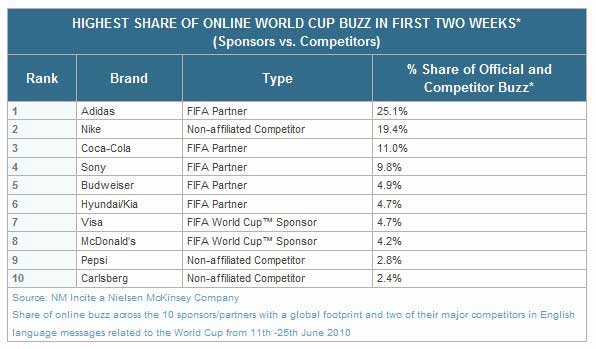Spain and the Netherlands may be the World Cup final contenders on Sunday, July 11, but official World Cup advertisers in the US and UK also scored big with TV viewers during the first half of the tournament, and their ads outperformed those of non-sponsors, according to Nielsen.
Ads in the US
An analysis of national US advertising during weekend ABC and ESPN matches, plus all Team USA matches from June 11 to 26, found that official sponsors—Adidas, AT&T, Budweiser, Hyundai, and Sony—connected better with World Cup fans than non-sponsors, registering on average 55% higher net likeability than commercials from non-sponsor World Cup advertisers.
In addition, such sponsors registered 16% higher brand recall for their World Cup in-game/in-studio elements, such as the Hyundai "Halftime Report" and the Adidas "First-Half Highlights," vs. their typical in-game sponsorship performance in other sporting events.
Among new campaigns launched by World Cup sponsors and non-sponsors since the start of the tournament, ads from Budweiser, M&M's, Macy's, Sony, and Hyundai scored highest in net likeability, with the greatest percentage of World Cup TV viewers recalling the commercial, the advertised brand, and reporting to like the ad "a lot" or "somewhat."
Likeability also varied by gender: Ads for Nike and Hyundai generated high net likeability for female World Cup TV viewers, whereas ads from Adidas and Cisco were hits with male audiences.
Ads in the UK
On ITV1 in the UK, during World Cup programming (new ad executions, including game, pre-game, and post-game analysis) from June 11 to 22, ads for BT Telecommunications, Churchill Insurance, The Sun, Renault Automobiles, and Carling all made the top 5 in brand recall. Among the top 5, only two—The Sun and Carling—were World Cup-themed.
Official World Cup sponsor Visa, which has aired World Cup TV ads outside the US only, also registered a 100% lift in likeability within World Cup programming.
Online Buzz: Adidas Reasserts Itself
World Cup partner Adidas has emerged a victor in a recent online battle with Nike, a non-sponsor, which had ambushed its way into the World Cup conversation with a popular soccer-themed ad (Write the Future) that spread virally across the online community, according to separate research from NM Incite, a Nielsen McKinsey Company.
Nike's efforts in the weeks leading up to the World Cup had pushed Adidas into the background of online conversations.
But in the first two weeks of the tournament Adidas overtook Nike as the top brand—possibly helped by the Adidas Star Wars Cantina 2010 viral video, featuring David Beckham.
Adidas buzz accounted for 25.1% share of World Cup buzz online vs. 14.4% before the event. Nike, meanwhile, dropped from 30.2% to 19.4%.

Part of Adidas's increased buzz levels was due to discussions around the Jabulani—the controversial official ball of the World Cup. For the week ended June 13, which included the first three days of the tournament, the ball accounted for 8% of all English-language messages related to the World Cup.
Looking for great digital marketing data? MarketingProfs reviewed hundreds of research sources to create our most recent Digital Marketing Factbook (May 2010), a 296-page compilation of data and 254 charts, covering email marketing, social media, search engine marketing, e-commerce, and mobile marketing. Also check out The State of Social Media Marketing, a 240-page original research report from MarketingProfs.
'Half the game in buzz is 'fanning the flames,' " said Pete Blackshaw, EVP of digital strategy at Nielsen. "The Adidas football Facebook page, for instance, is now up to over a million fans and they are dropping new content several times a day, all while the average post is generating upwards of 100 comments. At the end of the day, brands need to keep the buzz ball in the air as long as possible—sponsored or otherwise."
World Cup sponsor Budweiser, too, overcame a pre-tournament ambush from Carlsberg to assert itself as the most highly buzzed beer brand tied to the World Cup, climbing to 4.9% as it overtook Carlsberg, whose share fell to 2.4%.
Other official sponsors who enjoyed noticeable increases in World Cup buzz were Hyundai/Kia (from 2.4% to 4.7%) and McDonald's (2.8% to 4.2%).
The overall share of buzz for the 10 official World Cup partners/sponsors increased from 52% to 66% since the start of the tournament.
About the data: The NM Incite study compares the share of online buzz between World Cup sponsors and their major competitors in relation to the World Cup in the run up to the event (month-long period ended June 6) and during the first two weeks of the tournament (June 11-25). English language World Cup-related messages on blogs, message boards, groups, and video and image sites—including Flickr, YouTube, Facebook, and Twitter—were monitored for the study.



